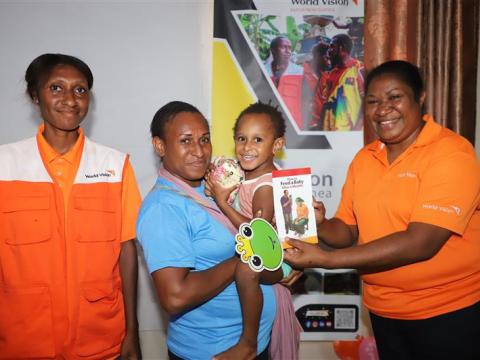Prioritise Breastfeeding, Creating a Sustainable Future

Child malnutrition continues to be a pressing challenge in many parts of Papua New Guinea, especially in remote communities where there is a lack of knowledge on food preparation, infant and young child feeding practices, and inadequate health services to ensure children receive the support they need to live their lives to the fullest.
A baseline study for World Vision’s BEAN project in Western Province found that 90% of households are chronically food insecure, with over half experiencing severe shortages during floods. Whilst fewer than 2% of children and 1.5% of women met the minimum dietary diversity threshold, and only 16% of mothers exclusively breastfed.
With the support from the Australian Government’s Department of Foreign Affairs and Trade(DFAT) through Australia’s NGO Cooperation Program(ANCP), the BEAN project and Village Health Assistants (VHAs) in Balimo, Delta-Fly District, continue to promote inclusive nutrition and caregiving through community-led education for behavior change and women’s empowerment.
Inclusive nutrition and caregiving for mothers and infants contribute significantly to babies’ healthy growth and development. Exclusive Breastfeeding for the first six months directly impacts the growth and well-being of babies, right up to adolescents.
Breastmilk gives babies the best start in life. It provides all the nutrients they need and helps protect them from common illnesses like diarrhea, pneumonia, and ear infections. It also toughens a baby’s immune system, supports healthy brain development, and encourages a deeper emotional bond between the mothers and their babies.
For families, breastfeeding is free, and for the environment, it is friendly. The production of breastmilk by lactating mothers is a natural and ongoing process that is clean and safe, making breastmilk always available at the right temperature for feeding with zero cost; important in places where clean water and proper sanitation may be limited. It is the ideal food for infants till they are clinically ready to transition to complementary feeding plus breastmilk. This practice is sustainable if mothers receive the right support and care.
From August 1–7, in commemoration of World Breastfeeding Week, our BEAN team in Balimo strengthened their efforts to combat malnutrition in our impact communities through community awareness activities in collaboration with the Delta Fly’s District Health Authority and Village Health Assistants. With the theme “Prioritise Breastfeeding, Creating Sustainable Support Systems,” we are reminded that breastfeeding is universally recognised as one of the most effective interventions to combat malnutrition and, therefore, must be supported and protected.
Through the BEAN project, we can reach mothers in eleven impact communities across the Delta-Fly District of Western Province. We provide not only vital information to support breastfeeding but also tools and resources for self-sustenance, ensuring that mothers and caregivers are equipped to fully nurture their babies.
World Vision PNG’s nutrition team works closely with 34 Village Health Assistants across our project sites, sharing information with pregnant women and mothers of children aged 0–5.
Some of the sustainable activities initiated by the BEAN project include:
- Mother Support Groups (MSGs) led by trained VHAs or lead farmers
- Kitchen gardening and home nutrition education
- Income-generating activities for mothers (e.g. Savings for Nutrition Groups)
- Male engagement forums to promote family support for breastfeeding
- Nutrition Clubs in schools to teach children at a young age the importance of a balanced diet
To support these awareness efforts, the BEAN project team supplies seedlings (corn, tomatoes, beans, spinach, carrots, capsicum), livestock (ducks and chickens), and farming tools (spades, forks, bush knives, files, wheelbarrows, and watering cans). These resources empower families to work toward improving nutrition in their communities.
This year’s theme aligns with World Vision PNG’s ongoing work in the vulnerable communities of Delta-Fly District, to provide essential nutrition support, improve maternal healthcare, and raise the standard of nutrition for children aged 0–5.To honor the week, the BEAN project team invited mothers and their babies along with partners and caregivers, to attend an interactive session.
Present on the day was District Health Coordinator for Family Health, Mr. Gordon Mase, he advised that “Breastmilk is the first meal a baby receives after birth. It is not just the mother’s role to breastfeed. Fathers also play an important role by providing the support both mother and child need during this crucial time, including nutritious meals, emotional support, and a conducive environment."
Our team also visited the Evangelical Church of Papua New Guinea Hospital in Balimo that serves patients in the the station and the outer village communities along the Aramia River. We donated close to 40 hygiene gift packs to children aged 0–5. Starting from the labour ward, our Village Health Assistant led the awareness session in the local language, helping mothers feel comfortable and ensuring they fully understood the message being shared.
Agricultural tools were then donated to support the hospital’s efforts to build a nutrition garden. The garden will supply the nutrition ward with fresh produce for patients, especially mothers and children in need of a nutritional diet. This activity followed shortly after 14 health care workers from the hospital were trained on Infant and Young Child Feeding, Nutrition & Malnutrition and Climate Climate Smart Agriculture.
Agnes Peno, Head of Health Promotion and Administration at ECPNG, shares, “This is not the first time World Vision PNG has supported the hospital, and we are grateful for the continued support to improve maternal health and child nutrition for our mothers and babies.”
Thanks to our donor DFAT through ANCP, we can work in close partnership with the District Health Authority, ECPNG Hospital, and the Department of Agriculture and Livestock in Balimo, Delta-Fly District. Up to this date, we have reached over 3820 mothers, impacted 2,005 children aged 0–5, including 253 people with disabilities and support through our nutrition and livelihood intervention.